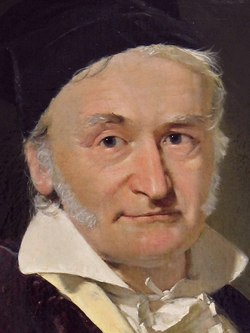
Cause of death: heart attack
Johann Carl Friedrich Gauss (German: Gauß [kaʁl ˈfʁiːdʁɪç ˈɡaʊs] ; Latin: Carolus Fridericus Gauss; 30 April 1777 – 23 February 1855) was a German mathematician, astronomer, geodesist, and physicist who contributed to many fields in mathematics and science. He was director of the Göttingen Observatory and professor of astronomy from 1807 until his death in 1855. He is widely considered one of the greatest mathematicians ever.
While studying at the University of Göttingen, he propounded several mathematical theorems. Gauss completed his masterpieces Disquisitiones Arithmeticae and Theoria motus corporum coelestium as a private scholar. He gave the second and third complete proofs of the fundamental theorem of algebra, made contributions to number theory, and developed the theories of binary and ternary quadratic forms.
Gauss was instrumental in the identification of Ceres as a dwarf planet. His work on the motion of planetoids disturbed by large planets led to the introduction of the Gaussian gravitational constant and the method of least squares, which he had discovered before Adrien-Marie Legendre published it. Gauss was in charge of the extensive geodetic survey of the Kingdom of Hanover together with an arc measurement project from 1820 to 1844; he was one of the founders of geophysics and formulated the fundamental principles of magnetism. Fruits of his practical work were the inventions of the heliotrope in 1821, a magnetometer in 1833 and – alongside Wilhelm Eduard Weber – the first electromagnetic telegraph in 1833.
Gauss was the first to discover and study non-Euclidean geometry, coining the term as well. He further developed a fast Fourier transform some 160 years before John Tukey and James Cooley.
Gauss refused to publish incomplete work and left several works to be edited posthumously. He believed that the act of learning, not possession of knowledge, provided the greatest enjoyment. Gauss confessed to disliking teaching, but some of his students became influential mathematicians, such as Richard Dedekind and Bernhard Riemann.
Source : Wikipedia